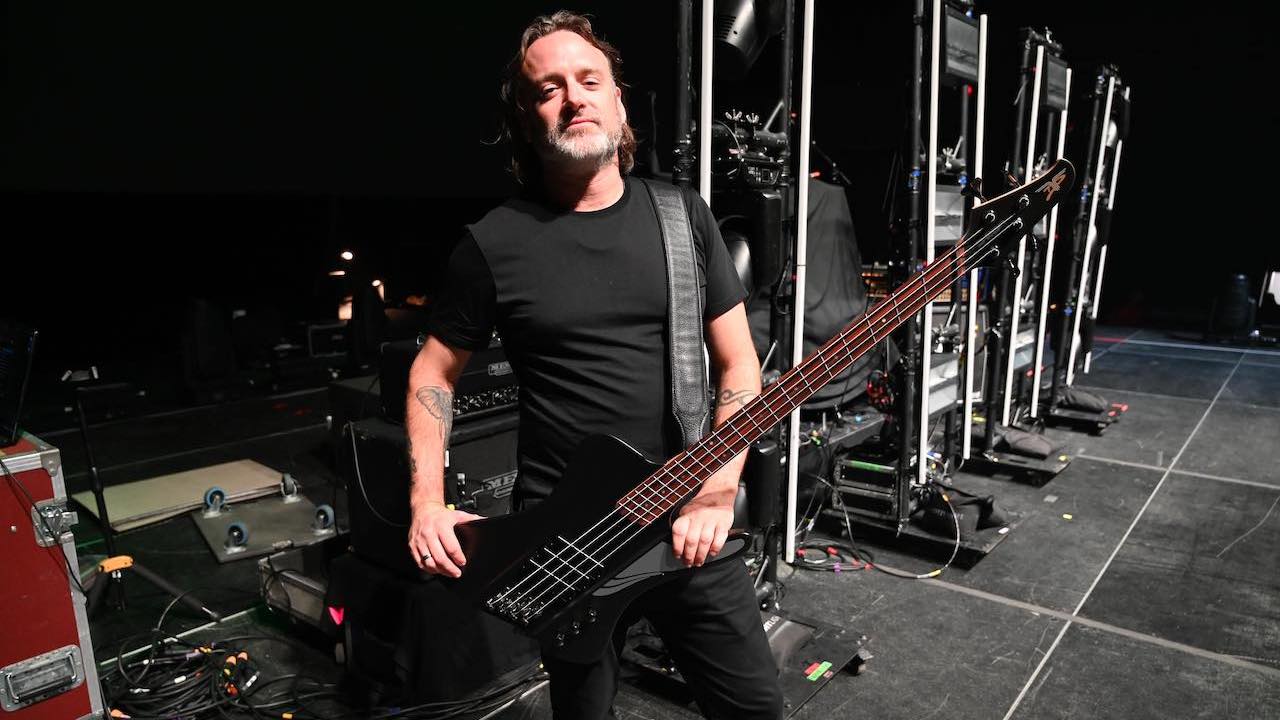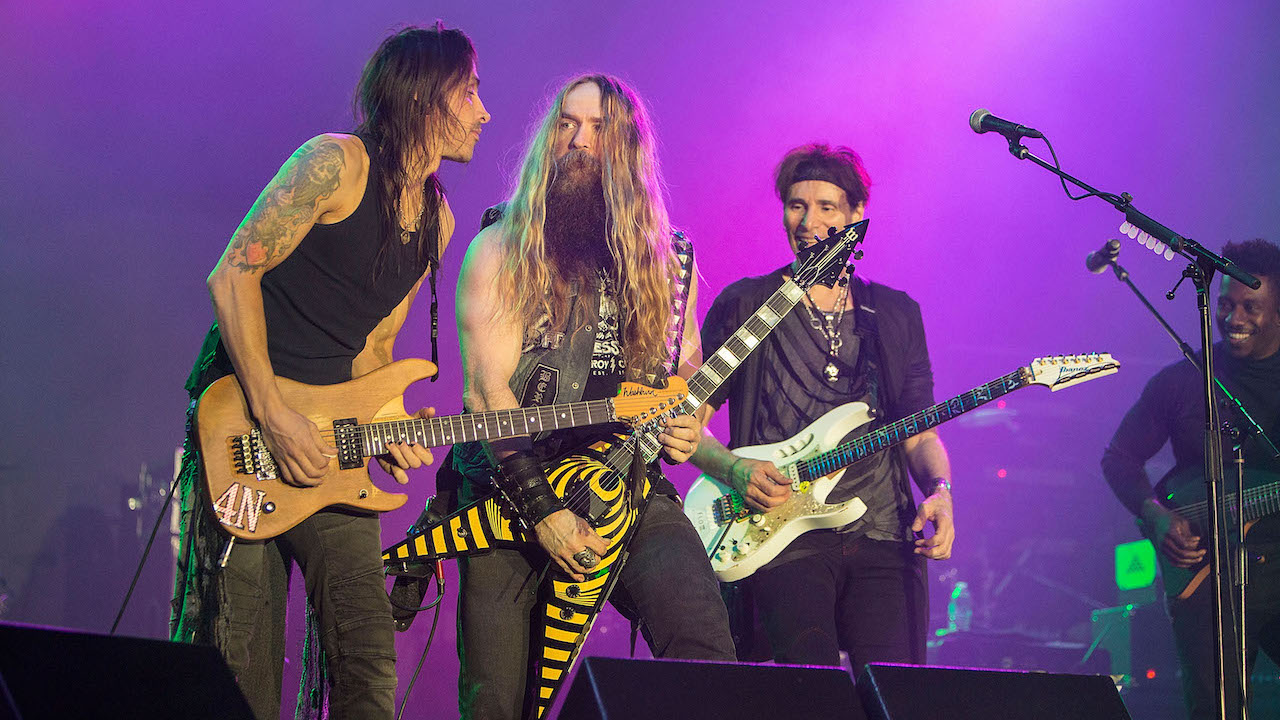“Steve Vai tried to school me on string bending, but you just don't do that on bass!” Pete Griffin reflects on his time with Steve Vai, and his latest solo EP
The seasoned sideman compares notes on Steve Vai, Yngwie Malmsteen, Nuno Bettencourt, Zakk Wylde and Dweezil Zappa

Pete Griffin’s reputation as an A-list sideman is founded on two decades of exceptional bass guitar work across a multitude of genres and musical settings. The very definition of his low-end artistry in recent times – though sadly it’s ended now – was a very special rock supergroup, Generation Axe, that saw Griffin share the stage with guitarists Zakk Wylde, Tosin Abasi, Nuno Bettencourt, Yngwie Malmsteen, and Steve Vai.
Yet in spite of his illustrious sideman career and the huge respect in which he’s held within the music world (and not just by bassists) – earning a 2008 Grammy Award with Zappa Plays Zappa – Griffin has never released a solo EP. Until now.
“I decided to start working on some of my own music during the pandemic,” said Griffin. “I had a home studio and I knew some of the world's best musicians who were willing to work on my songs. I’ve always seen myself as a sideman because that's what pays the bills, but I realised I needed to have control over something in my life during a time when I had very little.”
Pete Griffin and His Lab Rats is not a self-indulgent bass-centred release; instead, it’s an eclectic collaboration with some of today’s unsung heroes from the L.A. session scene. “As session players we’re not always paid to make creative decisions. Sometimes our job is to just shut up and play whatever’s written! But I didn’t realise how much creative energy we’d all been saving for something like this. It became a very collaborative project.”
So after months of anticipation Griffin’s new solo EP has arrived, but how does he feel about stepping out from his traditional sideman role?
“In the sideman world there can be various definitions of right and wrong. I might think that my idea is better than what the singer is asking me to do, but you can only work within the parameters that you’ve been given, and if that’s my job, then I'm very happy doing that. It can be an interesting dynamic, but having now produced my own music, I think I have a little more respect for the process.”
What was it like playing with Steve Vai, Yngwie Malmsteen, Zakk Wylde, Nuno Bettencourt, and Tosin Abasi, in Generation Axe?
Get The Pick Newsletter
All the latest guitar news, interviews, lessons, reviews, deals and more, direct to your inbox!
“All of those guys have a completely different approach. Yngwie would send recordings ahead of time and he would just expect you to know everything. Zakk Wylde might want to play a bunch of Black Sabbath covers, so that requires my best Geezer Butler impersonation!”
What about Steve Vai?
“Steve Vai is incredibly specific. There’s one tune called Gravity Storm, which sounded to me like the bassline was being played with a slide into the note. Steve stopped me in sound check one day and basically told me that I needed to bend the note up half a step before I hit it, and then let the string bend back down. I was like, ‘what are you talking about? You just don’t do that on bass!’ But he's so granular about the details, and it turns out the bassline sounded way better once I started doing that!”
Is it the same with Nuno Bettencourt?
“Both Steve and Nuno think more like a producer. They’d never just give me the recording to learn. Nuno would give me very specific instructions about what he wanted the bassline to do. Get The Funk Out by Extreme starts with a drum fill and he wanted me to play a dead note right in the middle of it, and he told me exactly where. He even sat down and showed our drummer how to play it!”

Tell us about the recent tour with Dethklok
“I was covering that gig for Bryan Beller, which meant that I had three different versions of what to play. There's the original that Brendan Small played on the record, which was pretty straight-forward. But then I’d go listen to Bryan and he's got his whole three finger thing going on. I’ve also done the gig a few times in the past, so I had to decide whether to play the bass part as it is on the record, trying to copy what Bryan’s been doing, or finding my own version.”
How much direction did you get ahead of time?
“Brendon Small knows that the album version works, and both Bryan and I have been working with him for years, so he trusts us whenever we want to add anything. Some days I'll check in with him, but otherwise I'm left to figure it out from the tracks I've been given.”
Do you have any new bass gear?
“I've been a Fender-type guy for most of my career. There was a point where there was an expectation to always play a Fender Jazz or P-Bass, but I’ve been really enjoying a Dingwall D-Roc that I just got, which has the multi-scale setup. I'm loving that bass just as much as the tried and true Leo Fender design. With Dethklok, I’m tuning down to low C and it can be hard to find a string that responds well at that range.”
“I have a Dunable bass that's a 35-inch scale and the E-string on the Dingwall is 36.25, so the extra scale length just makes everything more comfortable, especially when you’re playing the faster songs. I love that there are companies out there that are still open to trying something new, and I think people are a more open-minded about it nowadays.”
Tell us about the gig with Zappa Plays Zappa?
“I was the biggest Zappa fan before I got that gig, so I could already sing any song that Dweezil wanted to play. Dweezil might want to start working on Zomby Woof, which sounds like someone's switching the radio channel every four bars, but I had unknowingly been doing my homework for that gig without ever knowing that it was going to exist, so I already had it locked in. Joe Travers is in charge of the entire vault of Frank Zappa recordings, of which there are still years of tape. He’s still revisiting old recordings, so how do you ever stop?”
Did Dweezil feel under pressure from living in his Dad's shadow?
“I can't even imagine, but you know, Dweezil's such an incredible guitar player. He would struggle with certain musical concepts just because he hadn't gone to music school. He learned by having Eddie Van Halen come over to the house and show him how to play! There would be certain songs, like The Black Page or Inca Roads, where he'd play something unbelievable, but then he’d struggle with an eight bar phrase that the rest of us could play in our sleep. He was really kind of an anomaly like that, but I can't even imagine what it was like for him.”
“Towards the end of his life Frank was working almost exclusively with something called the Synclavier, which was a very early DAW. It was like a mini sequencer. He just got sick of working with human musicians and their physical limitations and their emotional baggage. That Synclavier took up the whole room, but now we have an infinitely more powerful computer in our pockets. So if Frank Zappa was alive today? It’s almost too frightening to think about.”
Do you think Frank Zappa’s legacy still resonates?
“It’s like King Crimson or some of these bands where you need someone to hold your hand and walk you through it. So I hope more people can find Frank Zappa and find that thing that they like instead of just going, ‘Oh, isn't he the Valley Girl guy?’ The first stuff that I got into was Apostrophe and Roxy & Elsewhere.
Tell us about One Shot Deal
“We’ve basically got the core band back together with the blessing of the Zappa family. We’re called One Shot Deal, and we were playing the music of Frank Zappa all around Southern California. People have been really excited to see our camaraderie. To bring that back around has been a real pleasure.”
- Pete Griffin And His Lab Rats is out now.

Nick Wells was the Editor of Bass Guitar magazine from 2009 to 2011, before making strides into the world of Artist Relations with Sheldon Dingwall and Dingwall Guitars. He's also the producer of bass-centric documentaries, Walking the Changes and Beneath the Bassline, as well as Production Manager and Artist Liaison for ScottsBassLessons. In his free time, you'll find him jumping around his bedroom to Kool & The Gang while hammering the life out of his P-Bass.
“This particular way of concluding Bohemian Rhapsody will be hard to beat!” Brian May with Benson Boone, Green Day with the Go-Gos, and Lady Gaga rocking a Suhr – Coachella’s first weekend delivered the guitar goods
“I was writing songs from eight years old, but once I got a guitar I began to deeply identify with music… building an arsenal of influences”: How Lea Thomas uses guitars her dad built to conjure a magic synthesis of folk, pop and the ethereal










